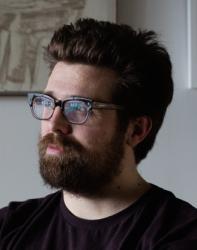Fríða Ísberg has just received the much-coveted Grassroots Grant from Icelandic Literature Center, an award intended to support new authors in publishing their first book. She also writes for the Times Literary Supplement and works as an editor for local publisher Partus Press, as well as publishing a recent collection of poetry titled ‘Ég er ekki að rétta upp hönd’ (“I’m Not Raising My Hand”) with the poetry collective Svikaskáld (“The Impostor Poets”), a group of poets who initially met through the Creative Writing department at the University of Iceland.
Poet pride
“The group was formed during a weekend in a summer house in the countryside,” Fríða explains. “It was six of us, all women, who travelled there with the goal of writing poetry together. We really didn’t know what the outcome would be but it soon dawned on us that we were all struggling with perfectionism and Impostor Syndrome, both as poets and in our professional lives. The publication of the book became a way to take a stand against perfectionism. Furthermore, as a group we found ourselves willing to take some chances that we might never have dared as individuals. It’s easier to take pride in a group that you belong to than to take pride in yourself, so the process was certainly liberating and empowering.”
The conversations that take place when writers and poets work together in groups such as the Svikaskáld collective are important, she says. “There’s nothing new about poets forming cliques and supporting one another, but the poetry scene today is a lot more spread out than it was when the local poets used to meet up at Unuhús and Hressingarkálinn [legendary gathering places of Reykjavík poets in the early twentieth century]. That’s why having umbrellas such as Partus Press and the Creative Writing department at the University of Iceland to gather under is so effective.”

Pacing, flâneuring
Among her many projects, Fríða will be spending the summer creating a new podcast with her friend and collaborator Brynja Hjálmsdóttir. “It’s called Póetrý Gó,” she explains. “It’s a reference to Pokémon Go, except we’re looking at how poets go out for walks to capture poems. Me and Brynja had often heard older authors and poets talk about the important part that going for a walk every day plays in their writing routine. We decided to look into it, both from the point of view of writers but also to examine how walking repeatedly crops up in poetry. There will be eight episodes in total, each one with a specific theme, and every week we will be interviewing a poet. This week we are discussing flâneurs and talking to Sigurður Pálsson.”
She is guarded on the subject of her forthcoming collection but stresses the important role of publication in the creative process. “Poems tend to be in a liquefied state for long periods of time,” she says. “At some point, you have to let the poems solidify into a concrete form through publication.”
Buy subscriptions, t-shirts and more from our shop right here!


















